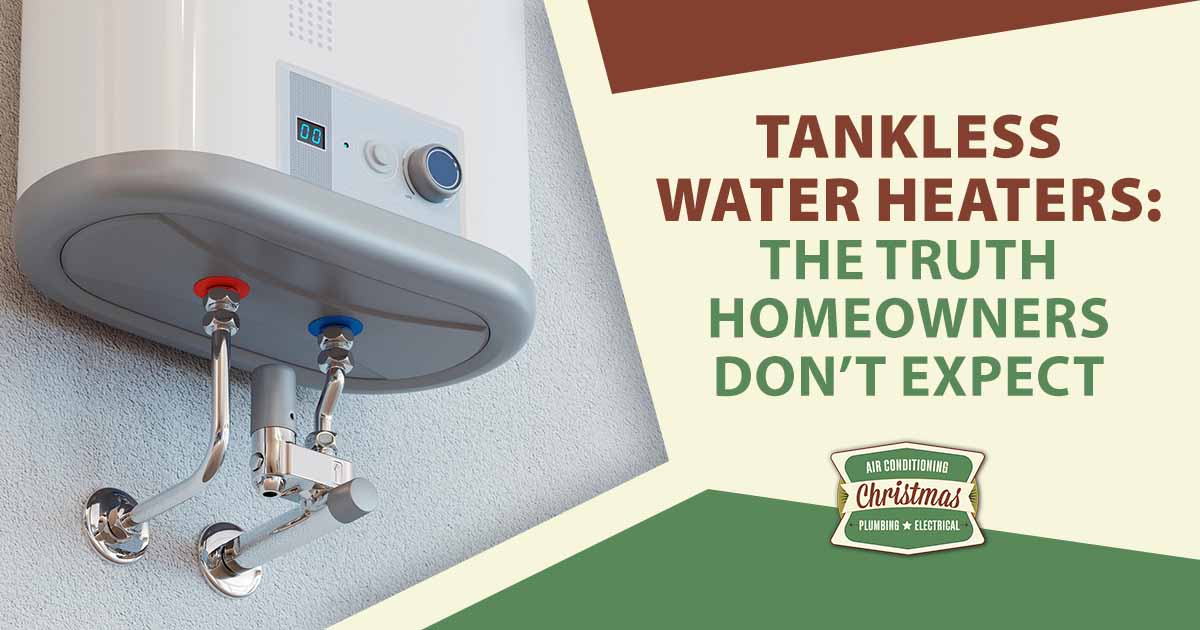When comparing a traditional water heater to a tankless water heater, many homeowners in Denton and the Dallas-Fort Worth area are surprised by what they learn. While tankless water heaters are often promoted as more energy-efficient and space-saving, the whole picture involves more than upfront benefits. At Christmas Air, licensed professionals help homeowners understand which system fits their household’s needs, usage habits, and budget.
Comparing Traditional vs. Tankless Water Heaters
Understanding the differences between traditional and tankless water heaters begins with understanding how each system works. Both are designed to provide hot water for a home, but the methods and performance vary significantly.
How Each System Works
A traditional water heater stores a set amount of hot water—usually 40 to 80 gallons—in a tank. It continuously heats this water to maintain the set temperature, even when not in use. In contrast, a tankless water heater, also known as an on-demand water heater, only heats water as it flows through the unit. There is no storage tank, and the system activates only when hot water is needed.
Key Differences in Function and Performance
The most significant performance distinction in the traditional vs. tankless water heater comparison is delivery. Traditional units may run out of hot water during periods of heavy usage, whereas tankless systems provide a continuous supply. However, tankless units can be limited in the number of fixtures they support at one time. Households with multiple simultaneous demands—such as running a shower and dishwasher simultaneously—may require numerous tankless units or larger-capacity models.
Initial Cost vs Long-Term Value
Traditional water heaters are typically less expensive to purchase and install. However, their higher energy use and shorter lifespan can make them more costly over time. Tankless water heaters have a higher upfront cost, including installation, but often last longer and consume less energy. Homeowners in Denton and the DFW area should evaluate both the immediate budget and expected long-term savings when deciding between a tank and tankless water heater.
Energy Efficiency: Traditional vs Tankless Water Heater
One of the most critical factors Denton and DFW homeowners consider when comparing a traditional water heater to a tankless water heater is energy efficiency. The way each system uses energy impacts both monthly utility bills and overall operating costs.
Standby Heat Loss in Traditional Units
Traditional water heaters experience what’s known as standby heat loss. Because the unit maintains a tank of water at a constant temperature, it continuously uses energy—even when no one is using hot water. This results in wasted energy, especially during periods of low usage or overnight hours.
On-Demand Heating Advantages of Tankless Systems
Tankless water heaters, by contrast, eliminate standby heat loss. Water is only heated when needed, meaning the system isn’t running constantly. This on-demand heating approach is more efficient, particularly for households that use hot water at irregular times. For many families, this translates to lower energy bills.
Real Energy Bill Comparisons
According to energy efficiency data, tankless units can reduce energy use by 25% to 35% compared to traditional models—depending on water usage patterns and home size. However, actual savings vary based on how often hot water is used, the number of occupants, and the fuel source. Homes in North Texas with natural gas may see faster payback periods than homes using electric tankless units.
Lifespan and Maintenance: Which Water Heater Lasts Longer?
When evaluating a traditional versus tankless water heater, homeowners should consider not only the purchase price but also the system’s lifespan and the required maintenance.
Average Lifespan of Traditional Water Heaters
Most traditional tank water heaters last between 8 and 12 years, depending on factors such as water quality, usage, and maintenance. Over time, sediment can accumulate inside the tank, especially in areas such as Denton and DFW, where hard water is prevalent. This buildup reduces efficiency and can lead to premature failure if not regularly flushed.
Tankless System Maintenance Requirements
Tankless water heaters typically last 15 to 20 years with proper maintenance. However, they still require regular service. Annual descaling is recommended in areas with hard water to prevent mineral buildup in the heat exchanger. Failing to perform this maintenance can reduce efficiency and shorten lifespan.
Replacement Frequency and Long-Term Ownership Costs
While a traditional unit may require replacement every decade, a well-maintained tankless system can serve a home for nearly twice as long. Over time, this can result in fewer replacements, less disruption, and lower cumulative costs—even though the initial installation of a tankless unit is higher.
Hot Water Supply and Usage in DFW Homes
Hot water needs vary widely depending on the size of the household and daily routines. When deciding between a traditional vs. tankless water heater, homeowners in Denton and the greater Dallas-Fort Worth area should evaluate how each system handles real-world demand.
Family Size and Usage Patterns Matter
Larger families typically use more hot water, especially in the morning and evening when multiple people may shower, do laundry, or run the dishwasher. In these scenarios, a traditional water heater with a larger tank might seem practical—until the tank runs out mid-use. Conversely, tankless units can continuously deliver hot water, making them a preferred option for households with staggered or extended usage throughout the day.
Tank Size Limits vs Continuous Flow
The tank’s capacity limits traditional heaters. Once the stored hot water is depleted, it can take 30 minutes or more to reheat a full tank. This can be inconvenient for larger households. Tankless water heaters, on the other hand, provide a continuous flow of hot water as long as the demand doesn’t exceed the system’s flow rate. This makes them ideal for consistent but not simultaneous high-volume use.
Performance in Larger Homes Common in Denton & DFW
Many homes in the Denton and DFW areas are spacious and equipped with multiple bathrooms. In these larger residences, a single tankless unit may not meet the demand if multiple showers or appliances are used at once. However, installing more than one unit or choosing a high-capacity tankless model can resolve this limitation. A traditional system with a large tank may suffice but will still have recovery time limitations.
Environmental Impact: Traditional vs Tankless Water Heater Systems
For many Denton and DFW homeowners, environmental responsibility is a growing priority. Understanding the environmental impact of traditional versus tankless water heaters can help guide an energy-conscious decision.
Carbon Footprint of Each System
Traditional water heaters, particularly those powered by electricity or natural gas, have a larger carbon footprint due to their continuous energy consumption. The need to keep water heated 24/7 results in more greenhouse gas emissions over the unit’s lifespan. This is especially true in homes where hot water use is intermittent.
Eco-Friendly Benefits of Switching to Tankless
Tankless water heaters operate only when needed, reducing wasted energy and lowering total emissions. Their on-demand heating technology achieves higher efficiency, typically exceeding 90% or more, depending on the model. Over time, this translates to less environmental impact and aligns with efforts to conserve natural resources in Texas.
Is It Worth It for the Average Texas Household?
For environmentally conscious households, tankless systems offer a clear advantage. However, to truly maximize their eco-benefits, proper sizing, installation, and maintenance are essential. Homeowners considering a switch should consult with a licensed professional—such as those at Christmas Air—to ensure the system is suited to their household’s size, water usage habits, and local climate conditions.
Upfront Costs and Incentives in the Dallas-Fort Worth Area
Cost is one of the most significant factors Denton and DFW homeowners consider when deciding between a traditional vs tankless water heater. While tankless systems can offer long-term savings, the initial investment is often higher.
Installation Costs for Traditional and Tankless Systems
A traditional water heater typically costs less to purchase and install, often ranging from $800 to $1,500, depending on size and fuel type. Tankless water heaters can cost between $2,000 and $4,500 when including professional installation. This higher price reflects both the complexity of the system and the labor required for retrofitting plumbing or upgrading gas lines, as needed.
Energy Efficiency Rebates or Local Utility Incentives
Homeowners in the DFW area may be eligible for energy efficiency rebates, particularly when switching from a standard tank unit to a high-efficiency tankless model. Local utility companies occasionally offer credits or discounts to promote water and energy conservation. It’s recommended to check with providers like Oncor Electric or Atmos Energy for the latest programs available.
Financing and Long-Term Cost Considerations
Although tankless systems cost more upfront, their lower operating costs and longer lifespan can offset that investment over time. Financing options, available through many HVAC and plumbing service providers—including Christmas Air—can make the switch more manageable. When evaluated over 15 to 20 years, tankless systems often result in fewer replacements and reduced energy bills.
When a Traditional Water Heater Might Still Be the Right Choice
Although tankless systems offer long-term benefits, there are situations where a traditional water heater may still be the more practical option for homeowners in Denton and the DFW area.
Budget Constraints and Short-Term Planning
For homeowners focused on upfront costs, a traditional water heater is typically more affordable. Installation is more straightforward and doesn’t require major plumbing or electrical upgrades. This makes it a suitable choice for those planning to sell their home soon or needing a quick replacement without significant investment.
Limited Usage or Smaller Properties
In homes with minimal hot water usage—such as vacation properties, small apartments, or homes with one occupant—a tankless system may not offer enough savings to justify the cost. In these cases, a traditional unit provides reliable performance at a lower initial expense.
Renovation and Retrofit Limitations
Switching to a tankless unit in older homes may require changes to gas lines, venting, or electrical panels. These updates can drive up installation costs. When retrofitting is too complex or expensive, sticking with a traditional model may be more feasible, especially if the current setup is compatible with a standard replacement. Whether you’re leaning toward a traditional unit or considering a tankless upgrade, the experts at Christmas Air Conditioning & Heating are here to help. Their licensed plumbing professionals serve homeowners throughout Denton and the Dallas-Fort Worth area, offering honest recommendations tailored to your home, usage, and budget.
📞 Call Christmas Air at 469-919-9928 today. Fill in the contact form for a fast, no-obligation consultation.

